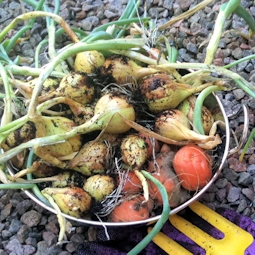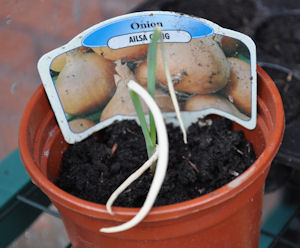
One of the most versatile ingredients for many dishes has to be onions. The majority of mine have onions in some shape or form, whether they’re red, white or just small shallots.
Without going into too much depth, there is a lot of goodness in our onions and we’d all do well to eat more of them than we actually do, depending on our current intake.
Why are onions good for us?
In a word, phytonutrients, or plant nutrients as I know them better. The substances that help prevent some diseases and are good for our health. If you don’t know what those are, you’re in good company. Neither did I, until I skimmed through the notes from my University course from years ago. I must have known at some point, but it had been very well forgotten. All I could remember was that they beat tomatoes and carrots hands down.

Where are the nutrients?
What I did remember, was to peel onions very lightly, taking off only the outer skin where possible, to keep the best flavour of the onion. I grew up having the benefits of a thin peel for potatoes from my grandmother, but the benefit of onions hadn’t been drummed into me so well.
When onions are cooked for soup making, they don’t lose their health benefits. Some will leech into the water or stock, but they’re still there, doing us a lot of good when they’re cooked into our food.
There is also some discussion around whether onions help reduce our stress levels. Just for that reason alone, it’s worth adding them into our diet. I find that when they’re cooked into food, a strong oniony taste disappears, which is always good if we’re cooking for children and making smooth soups, where the individual taste of vegetables can be easily hidden from children.
Cooking onions for soup.
Using the sauté method, where we slowly cook our onions until they’re soft, brings out the natural flavour that many of us love.
Happy hearts.
Like garlic, onions have a beneficial effect on our hearts. There has been talk about onions helping to stop clots forming in blood, but how true that is, I haven’t had time to research fully. As a mum, I’m happy to go with the old wives tale of onions being a natural reducer of cholesterol.
A kitchen garden vegetable.
As a plot renting household, we tend to always have plenty onions on the go. They’re easily grown and fresh onions always seem to taste sweeter than their shop bought companions. We successfully grow traditional onions as well as the small sweet spring onions and their leeky companions.
Our onions tend to differ in size and colour, often with different varieties mixed together, but we find the small yellow ones easiest to grow in our cool climate.

Where did onions come from?
On the internet, I found that people tend to say they came from Egypt, thousands of years ago. They were held in high regard and even buried in tombs with important people.
Choosing and Storing Onions.
Make sure your choices have a good round shape with an unbroken stem and a crispy top layer. Soft spots and dark spots can mean the onion is past its best and are best avoided. In the past, I’ve made the mistake of putting onions in my fridge, but that should really be avoided as often as possible. Keep them in the dark, in a dry but well ventilated room. I’ve kept onions for up to a month, but sweeter varieties can degrade more quickly.
Helping the Stinging Eye Syndrome.
I suffer from this badly, yet my youngest child can chop the meanest of onions and shed never a tear. When we cut into onions, we release a natural gas that can bring a tear to the eyes. Apart from being incredibly useful for actors, there seems to be little other benefit for the rest of us.
I’m told the following can work, but for me, these seem to do nothing. And I’ve tried them all.
- Using a very sharp knife.
- Cut low and stand tall, maximising the distance between your eyes and the onion.
- Wear glasses. I have to say that I wear glasses most days and they don’t help me with this problem at all.
- Stick the onions in the freezer for a few minutes before chopping.
- Chop them up outside.
- All of the above.

I cheat and use frozen ready chopped onions.
I often use frozen onions too, though much of the year we get onions from our plot, which is always nice, but they make my eyes water even more than shop bought ones do.
My red onion sets have just been dispatched so they should be here soon. I tend to keep those fpr slicing into salads or cheese and onion toasties 🙂